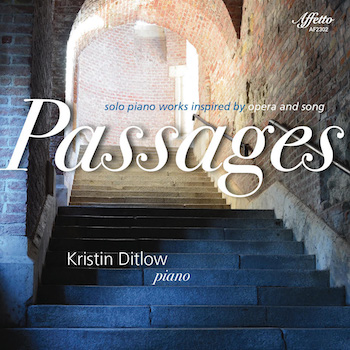Classical Album Review: Kristin Ditlow’s Deeply Affectionate “Passages” — Making the Piano Sing
By Ralph P. Locke
In this splendid album, pianist Kristin Ditlow shares her love of the piano in melody-drenched works from many lands and peoples.
Kristin Ditlow: Passages — Solo Piano Works Inspired by Opera and Song
Affetto AF2302 [2 CDs] 136 minutes
To purchase or to hear a track, click here.
 The piano is, technically, a kind of percussion instrument, in the sense that its strings are hit rather than bowed or plucked. (It’s certainly not a wind instrument!) Nonetheless, pianists have been making the piano sing ever since it was invented in the early 18th century.
The piano is, technically, a kind of percussion instrument, in the sense that its strings are hit rather than bowed or plucked. (It’s certainly not a wind instrument!) Nonetheless, pianists have been making the piano sing ever since it was invented in the early 18th century.
One of their favorite ways to demonstrate the piano’s ability to create a sense of melodic surging or caressing has been to arrange beloved songs and arias for the instrument. In this they are aided by certain techniques that they have developed over time, such as arpeggios (chordal notes played separately but, often, smoothly connected by use of the right pedal).
Kristin Ditlow, a renowned pianist and conductor, associate professor of Opera Coaching at the University of New Mexico, and music director of the UNM Opera Theatre, has now come out with a two-CD set of solo-piano pieces that are based on songs and arias and that demonstrate just how captivatingly 10 fingers can evoke the singing voice. (You can hear any track here and can purchase it here. The album is a kind of follow-up to a CD on which she accompanied the remarkable saxophonist Eric Lau in over a dozen songs from various centuries. Ditlow was also harpsichordist on a recent CD of cantatas by the German Baroque composer Christoph Graupner. A critic in American Record Guide praised the group for playing “admirably in period style.”)
The repertory here is quite varied, and all of it will be accessible even to a listener who may not know much classical music. The more experienced listener will encounter old favorites here — such as Robert Schumann’s song “Mondnacht” or the aria “Casta diva” from Bellini’s Norma — but in a new guise.
The arrangements are by masters of the art of arranging for the piano, including Franz Liszt, Clara Schumann, Teresa Carreño, Sergei Rachmaninoff, Percy Grainger, Abram Chasins, and Ditlow herself.
I was particularly delighted to get to know Carl Czerny’s “Fantaisie brillante” on themes from Mozart’s opera The Marriage of Figaro; Grainger’s stirring take on the Gershwin song “The Man I Love”; Ditlow’s evocative version of Cuban composer Ernesto Lecuona’s famous “Malagueña”; and Béla Bartók’s intriguing “Eight Improvisations on Hungarian Peasant Songs.” The selections, and the arrangers, come from many lands, including Italy (Mascagni’s passionate orchestral Intermezzo from Cavalleria rusticana) and China (“Mongolian Shepherd Song” — the evocative arrangement is by Ditlow herself).

Pianist Kristen Ditlow. Photo: courtesy of the artist
The most surprising tracks, perhaps, are four of the Twenty-Four Negro Melodies (1905) arranged by Afro-English composer Samuel Coleridge-Taylor. The melodies (what are sometimes called “spirituals”) are relatively simple, often consisting of a single phrase repeated several times with slight but telling adjustments. (This musical simplicity helps throw attention to the words, which deal with suffering, consolation, and hope.) The vocal range is sometimes restricted to a sixth, well short of the octave-and-a-half that is typical of many songs and arias, but very appropriate for group singing. Coleridge-Taylor took the relative modesty of the musical materials as an invitation to be inventive, gradually breaking a tune up into phrases and motives that he tosses back and forth through different keys and with imaginatively changing figuration, much as he did in the development sections of his many sonata-form movements for a purely instrumental chamber ensemble. I was reminded at times of the stirring climaxes in Romantic masterpieces such as Brahms’s “Edward” Ballade, Op. 10, no. 1.
I have played this album repeatedly for weeks, sometimes on CD, other times through streaming, yet I have never tired of it. Ditlow’s performances are not hyper-virtuosic. (For a fleeter reading of Liszt’s arrangement of the Spinning Chorus from Wagner’s The Flying Dutchman, I recommend the 1928 recording by Alexander Brailowsky.) But they are deeply affectionate: I sometimes felt I could hear Ditlow thinking about the (silent) words, noticing a surprising modulation, or responding to the tension-and-release within a musical phrase. (I know her somewhat, from having taught her in a seminar at the Eastman School of Music, where she earned her DMA.)
Heads up: The metadata, at least on Spotify, has some errors. The “Liebeslied” attributed to Schubert is by Schumann (as the CD case and booklet correctly report; this is the song that Schumann, though not Liszt, called “Widmung”). And John C. Baker is listed sometimes as performer or arranger, whereas he was in fact the co-producer (with Ditlow) and recording engineer. A recording as interesting and involving as this deserves to have its contents accurately reported!
Ralph P. Locke is emeritus professor of musicology at the University of Rochester’s Eastman School of Music. Six of his articles have won the ASCAP-Deems Taylor Award for excellence in writing about music. His most recent two books are Musical Exoticism: Images and Reflections and Music and the Exotic from the Renaissance to Mozart (both Cambridge University Press). Both are now available in paperback; the second, also as an e-book. Ralph Locke also contributes to American Record Guide and to the online arts-magazines New York Arts, Opera Today, and The Boston Musical Intelligencer. His articles have appeared in major scholarly journals, in Oxford Music Online (Grove Dictionary), and in the program books of major opera houses, e.g., Santa Fe (New Mexico), Wexford (Ireland), Glyndebourne, Covent Garden, and the Bavarian State Opera (Munich). He is on the editorial board of a recently founded and intentionally wide-ranging open-access periodical: Music & Musical Performance: An International Journal.
